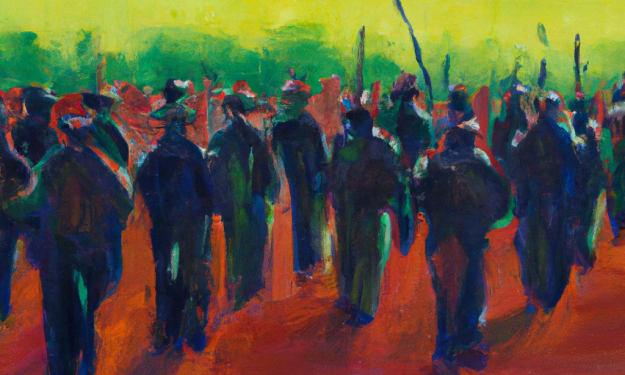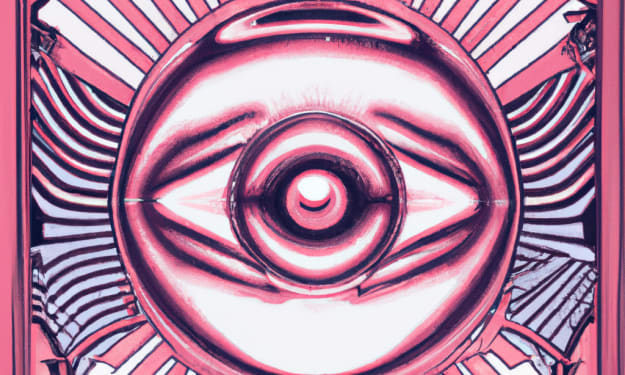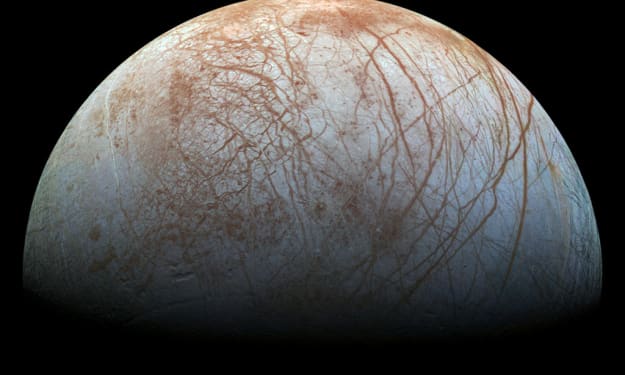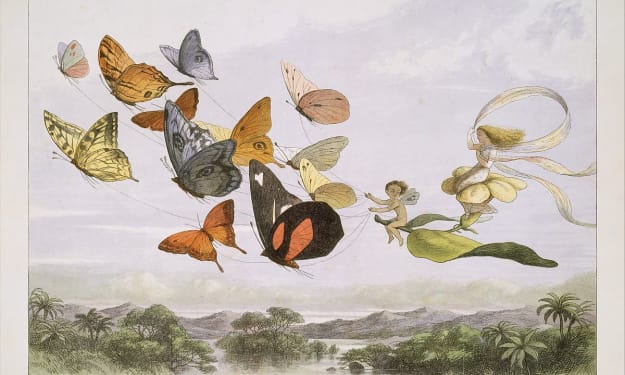
Sabine Lucile Scott
Bio
Hi! I am a twenty-nine year old college student at San Francisco State University majoring in Mathematics for Advanced Studies. I plan to continue onto graduate school in Mathematics once I am finished the plethora of courses which remain.
Stories (25/0)
The Laurent Phenomenon and Somos Sequences
The Laurent Phenomenon is a general phenomenon which has also special cases in which “Laurentness” is involved. Their introductory theorem states: “In a cluster algebra of geometric type, each cluster variable can be expressed as a Laurent polynomial with integer coefficients in the elements of any extended cluster” [1]
By Sabine Lucile Scott6 months ago in Earth
Muslims in Russia
The main faith in Russia is Russian Orthodoxy and its influence is international. I was baptized in a Russian Orthodox Church in San Francisco and occasionally attend the Orthodox Church in Berkeley. The current situation in Ukraine is a topic there: the priest leads a prayer to the end of Russia’s War with Ukraine. This paper focuses on struggles that Muslims in Russia faced concerning unfair treatment and assimilation during and after the Soviet Union. Many Westerners are unaware of the fact that the Soviet Union was anti-religious and encouraged an atheism. People who were religious had to practice less publicly, in private, or not at all after the fall of the Czar. This is because the Marxist style of communism that took over Russia rejected religious authority in favor of the state. The many Soviet Socialist Republics contain individuals of many different religious faiths. Russia has a long history with Islam. There are many similarities between converts to Islam in various countries, since recent converts are very conservative compared to Muslims who were raised that way. Young Muslims in Russia are surprisingly observant today, often even mores than the older generation. This is because new converts in Russia try to adhere to every rule they can and the generation that converted before them. There are many locations in Russia and the former Soviet Union that are historically Muslim. The percentage of Russians that are Muslim is fairly small, but many Muslims expect higher rates of conversion, partially because they believe that it is the right way to live life and people will naturally figure that out on their own, and partially because Muslim families in Russia have higher birth rates. There are two types of Islam in Russia, people who were born and raised Muslim because of their culture and people who have converted recently on their own, for various reasons. No more than half of those surveyed in Russia, the Balkans and the former Soviet republics of Central Asia say religion is very important in their lives” (Pew Institute). I found that the Pew Research Center has a lot to offer on this topic. Almost half of all Russian Muslims are very concerned about religious extremism in Russia. The same percentage do not approve of violence against civilians in defense of Islam. What of the contemporary challenges faced by Muslim of Russia and their relations with the state and their relations among themselves?” (Fawaz 2016, 365). This sentence is very relevant to my research question which concerns the link between Russia’s contemporary Muslims and the modern Russian Federation itself.
By Sabine Lucile Scott9 months ago in Humans
Weaire-Phelan Structure
The Weaire-Phelan structure has 0.3 percent less surface area than the Kelvin structure, which was thought to be the solution to the Kelvin problem since 1887 until a better solution (the Weaire-Phelan structure) was discovered by Denis Weaire at Trinity College Dublin using software which was modern in the early nineties. As part of his "experimentation", Denis Weaire visited the local bar with some bubble making instruments and investigated the bubble foam at the top glasses of beer. The software he used to make the calculations is called Surface Evolver. Designs using the Weaire-Phelan structure include a sculpture at Trinity College and the Beijing Water Cube. The insulation caused by the shape of the plastic cells helps to keep heat in the building. [1]
By Sabine Lucile Scott10 months ago in Earth
Bloodshed in El Salvador
Roberto Lovato’s Unforgetting: A Memoir of Family, Migration, Gangs, and Revolution in the Americas has a strong theme of violence throughout it. Roberto has personal experiences with violence, although most of the mentions of violence in his story is about atrocities committed by gangs or the Salvadoran government: “The news from El Paso and my friend’s terrified social media responses tighten my shoulder and neck, my body reminding me of those times someone has tried to hurt or kill me” (Lovato 2020, XVI). In Chapter 11: San Francisco 1979, Roberto is attacked by a “big cholo dude” and he is proud of himself after he beats the guy up and walks away pretending that it was not a big deal so that he would seem tough. Lovato writes: “The last time I visited the country was 2013, the year we buried half of my mother’s ashes in her hometown of San Vicente, where my goddaughter and I barely escaped gun-wielding gang members who chased us-in the cemetery” (Lovato 2020, 45). Roberto has returned to El Salvador trying to understand the revolving door system of people becoming refugees, child soldiers, and gang killers. When Roberto interviews a gang member, he asks him to identify the causes of violence in El Salvador apart from the extermination squads. Santiago, the gang member gives a long description of how the destruction of the family, caused by societal trauma leads to different traumas for each individual in the family and shows how all of these circumstances are linked together and lead to further violence. (Lovato 2020, 211).
By Sabine Lucile Scott11 months ago in Criminal
The Intersectionality of Class and Age in the Bolivian Marketplace
“In 1918, complaints about the presence of “comerciantes minoristas ambulantes” on the streets of Cochabamba began to appear in newspapers. Writers protested against vendors “who don’t pay the patent municipal or any other kind of tax””(Goldstein 2016, 84).
By Sabine Lucile Scottabout a year ago in The Swamp
The Informal Sector of the Cochabamian Economy
Cochabamba is the fourth-largest city in Bolivia and is located in a valley in the Andes mountain range. In Owners of the Sidewalk: Security and Survival in the Informal City, Daniel Goldstein writes about the people who had to relocate to the city from the agricultural lands and mining towns due to the effects of neoliberal reforms. In 1993, Planning Minister Gonzalo Sanchez de Lozada was elected and soon after, the laws concerning imported food were changed such that the Bolivian farmers, who had lost their government-provided subsidies, could no longer compete with foreign farmers. (Goldstein 2016, 37). According to Cultural Anthropology: A Toolkit for a Global Age, by Kenneth Guest, “ Stratification and inequality became more pronounced in industrialized capitalist economies over recent centuries, and this uneven development appears to be accelerating under forces of globalization” (Guest 2020, 345). As the nation globalized, the city’s informal economy grew.
By Sabine Lucile Scott2 years ago in The Swamp
The Europa Colonists
Nobody can hear a scream in the vacuum of space, or so they say. The exterior cameras caught footage of the incident. It was somewhat horrific. There had been some damage with one of the circuits which ran the exit portal usually used for robots exiting to make external fixes on the space station. The door opener had been tripped and a person, a female person, had been essentially ejected from the space station. Usually, robots used this in order to access the outside of the space station but they were always tethered before they exited. The entire area around the ejection portal was sterile and clean. All the surfaces were white and dustless, the cleaning robots went through these hallways a lot, vacuming up any dust and few people came in to dirty the space. Also, they didn't need to breathe, so they didn't need spacesuit enabled with an air supply. The footage contained the moment right after the young woman had been ejected from the space station. She must have been trying to open the window covering further to take more photographs, but the wrong button had been pressed at the ejection location, so she was immediately dumped into the vacum of space just outside the space station. There was a tether for when robots or suited construction workers used the ejection spot to go out into the darkness of space and repair the outside of the space station, but she wasn't connected to this tether at all. Even if she had been tethered she would have most likely died anyways since being out in space unsuited still would have killed her in under a minute. She had been trying to do some photography and even though people were banned from this wing, and only robots were allowed to access and walk about the storage area, she had snuck in with her camera and had been shooting through the window of the portal. The side of Europa which was facing away from the sun often glowed in the dark, and the young woman had always tried to take photos of the unique aspects of Jupiter's most beautiful moon.
By Sabine Lucile Scott2 years ago in Futurism
Weeping Ice
I started at a private liberal arts college when I was seventeen. I moved into a fourth floor room in Logan Hall. I didn’t have a roommate because they were doing some construction in the building and the ceiling had just been redone. As a result, I had a larger double room all to myself. I didn’t really need it, though, since I spent most of my time during the first semester, off campus, visiting my secret girlfriend.
By Sabine Lucile Scott2 years ago in Fiction
The Affect of Ageism on Society
The main topic of this paper is ageism and the affect it has on individuals in society. According to the World Health Organization, ageism “ refers to the stereotypes (how we think), prejudice (how we feel) and discrimination (how we act) towards others or oneself based on age” (World Health Organization. (n.d.). Ageing: Ageism) The problems that come with ageism are noticeable early in life: "By the age of four years old, people “become aware of their culture’s age stereotypes.” (World Health Organization. (n.d.). Ageing: Ageism) This data, points to just how important it is to study ageism. If even a kindergarten-age child recognizes the evidence of the oppression that can be caused to people in different age groups, that signifies just how pertinent the issue is to all societal groups.
By Sabine Lucile Scott2 years ago in Longevity
Irish Faerie Narratives
The Irish Catholic Church is by far, the most powerful institution in both Northern Ireland and Ireland, which are technically separate countries since the schism one hundred years ago. Irish Catholics created communities for themselves the world over. Some of the saints in the Irish Catholic Church have origin stories that are told as part of the Irish fairy story cannon. Catholic Church's hagiography of a saint's life is usually very dissimilar from the folk tale version, but the names and themes are often the same.
By Sabine Lucile Scott3 years ago in Wander













